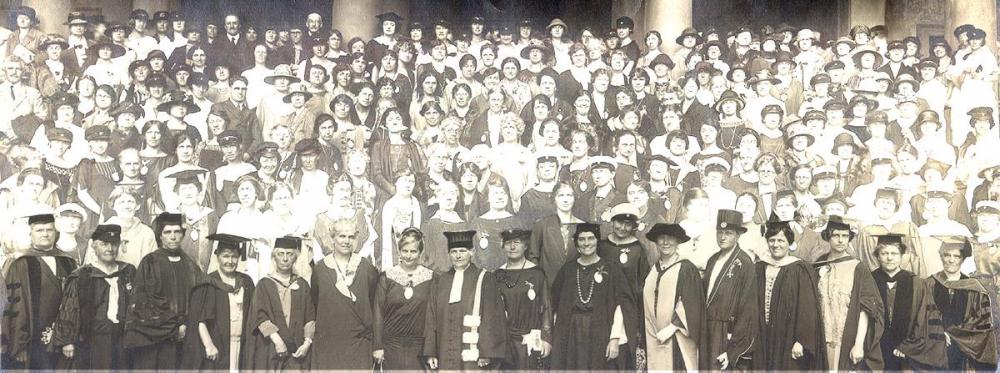Max-Planck-Institut für Wissenschaftsgeschichte
Boltzmannstraße 22
14195 Berlin
E-mail: coertzen@mpiwg-berlin.mpg.de

IFUW convention, Paris 1922. Courtesy IFUW, Geneva.
A small circle of British and American professors established the International Federation of University Women (IFUW). Most of the founders appear in this image. Pictured here on the steps of the Sorbonne are attendees of the IFUW’s second major gathering in Paris. By 1922, participants from seventeen nations had joined the IFUW. German academic women become part of the IFUW in 1926.
A life-long bond forged by two women – Caroline Spurgeon of Bedford College in London and Virginia Gildersleeve of Barnard College in New York City – was at the heart of the IFUW network. American college presidents Martha Carey Thomas (Bryn Mawr, Pennsylvania) and Mary Woolley (Mount Holyoke, Massachusetts) were among the founders; so, too, were British physician Winifred Cullis and biochemist Ida Smedley MacLean. All of the founders were members of the first generation of women to attain university or research positions around 1900.
Active correspondence and targeted visits to peers in other countries enabled these women to rapidly expand the IFUW. Mariá de Maeztu agreed to organize academic women in Spain; her counterparts in France were Anne Amieux and Marguerite Mespoulet. In Italy, Isabella Grassi brought women together to advance the IFUW’s policy agenda. In Scandinavia, the most active women in the international women’s network were Ellen Gleditsch, Eva Ramstedt, Kristine Bonnevie, and Karin Kock. Elise Richter set up the Austrian association. In Germany, Gertrud Bäumer, Elisabeth Altmann-Gottheiner, Marie-Elisabeth Lüders, Rhoda Erdmann, and Lise Meitner emerged as vocal proponents.
Many of the IFUW members had either studied and/or conducted research abroad. This fact helps to explain how the IFUW was able to expand so quickly in so many different nations. From the late 1880s onward, a transatlantic female elite had emerged in a variety of nations, the true scale of which only became evident after 1919.